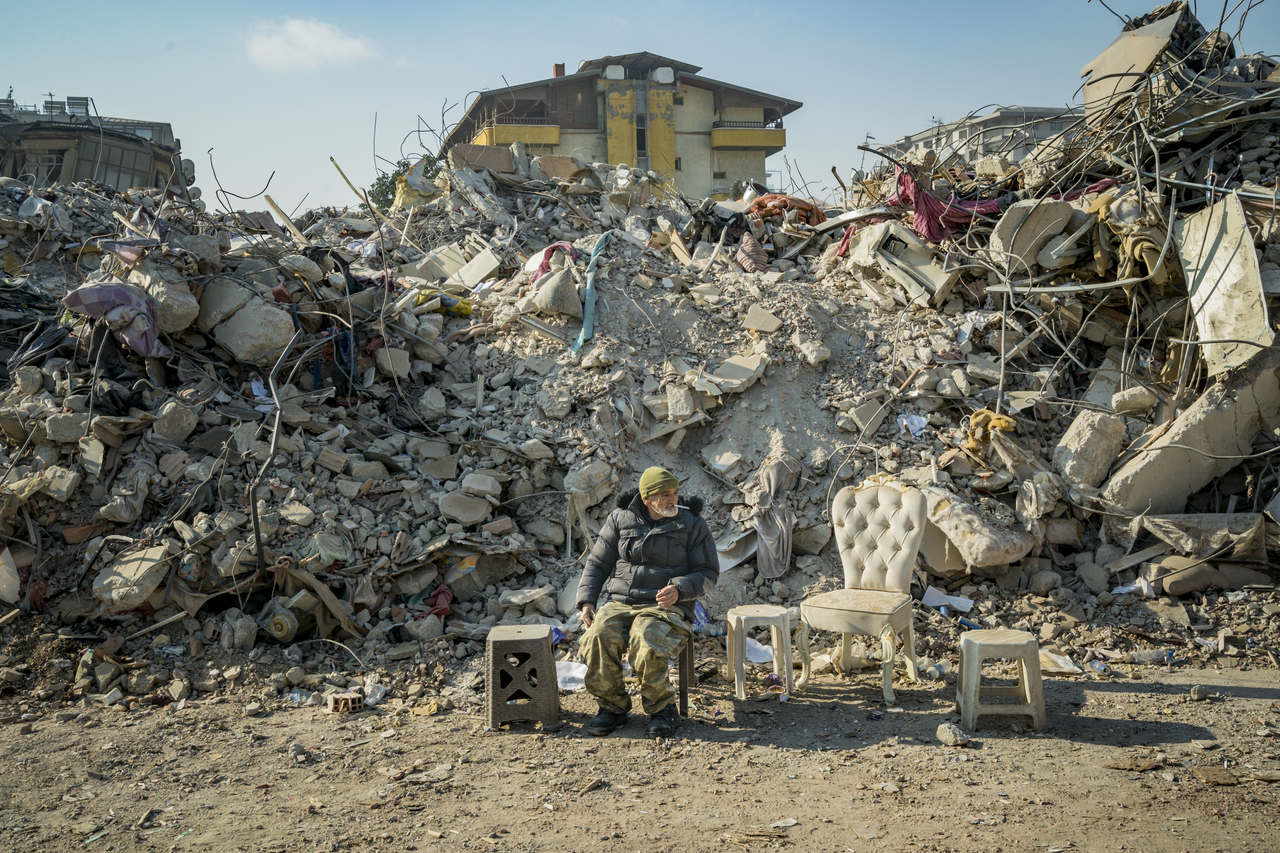Earthquake Rattles the Political Scene in Türkiye
On 6 February, there was a large earthquake in southeastern Türkiye and northern Syria. The delayed response of the Turkish authorities and emergency services has sparked criticism in particular from the opposition. The aftermath of the natural disaster will magnify the country's economic crisis and may prompt Erdoğan to use the crisis as an opportunity to unite Turks in the face of the quake-related human and property losses and keep the date of the parliamentary and presidential elections, announced for 14 May.
 Celestino Arce / Zuma Press / Forum
Celestino Arce / Zuma Press / Forum
The 7.8 magnitude earthquake struck 10 poor, agricultural southeastern provinces of the country: Adıyaman, Malatya, Kilis, Gaziantep, Kahramanmaraş, Osmaniye, Şanlıurfa, Diyarbakır, Adana, and Hatay. More than 20 million people are estimated to have been affected, with the death toll in both countries exceeding 45,000. The World Bank estimated the earthquake damage in Türkiye at $34 billion (equivalent to 4% of Türkiye’s GDP in 2021). It is estimated that half of the 3.4 million buildings in the disaster area in southeastern Turkey may need to be demolished.
Turkish Government’s Response
The ruling AKP came to power shortly after the 1999 earthquake in northwestern Türkiye amid a wave of criticism of the then-ruling team’s response to the disaster. At the time, the AKP leadership promised that if it took power, it would curb past mistakes in emergency management, including corruption. In the first years of the AKP’s rule (since 2002), it generally lived up to these announcements. This changed in subsequent years. Erdoğan, while still prime minister, encouraged development while his administration neglected to enforce safety standards. The process was accompanied by corruption in the construction sector. Government contracts were awarded to businesses loyal to the AKP.
The combination of these factors was reflected in the government’s inadequate response to the 6 February earthquake and aftershocks and added to the scale of the devastation and the number of casualties. State media, in line with the president’s rhetoric, promoted a quasi-religious narrative according to which the earthquake was the “Plan of Providence”. This reflects the practice of the authorities funding religious institutions at the expense of emergency services. For example, in this year’s budget they allocated TRY 35.9 billion (€1.78 billion) to the Presidency of Religious Affairs (Diyanet), but only TRY 2.3 billion (€110 million) to the agency responsible for emergency response (AFAD). The agency’s underfunding in the face of such a massive earthquake has rendered it ineffective in its relief efforts. Both its staff and Turkish soldiers showed up late to the scene of the disaster.
Despite the delayed response, the government has been trying to support earthquake victims. In the first days after the disaster, Erdoğan declared a three-month state of emergency in the affected provinces, after which he announced that construction of new housing in the affected areas would begin as early as March. The government also created a TRY 20 billion (just under €1 billion) investment support package for the affected provinces. According to the announcements, the new structures erected there will not exceed 3-4 stories (compared to the 6-story housing blocks that collapsed). An important step in bringing humanitarian aid was also the opening of the Bab al-Salam and al-Rai border crossings (about 40,000 Syrians returned from Türkiye to rebel-controlled northwestern Syria.
Opposition Position
Following the disaster, the Turkish government was criticised by the opposition, which stated that the government’s response to the earthquake was “inept”. Kemal Kılıçdaroğlu, the leader of the Republican People’s Party (CHP), blamed the government for the extensive damage caused by the disaster, pointing to excessive centralisation of the state, corruption in the construction sector, and the government’s downplaying the enforcement of building standards. The Turkish Chamber of Town Planners was also critical of the state, stating that low-quality construction projects had been legalised through government reforms.
The opposition has also reacted against the possibility of the government postponing this year’s elections. Speculation on the matter arose after Bülent Arınç of the AKP proposed postponing them due to the disaster to 2024. Kılıçdaroğlu said he believes that the elections should be held on time and that, according to the constitution, the only situation that allows an exception in this regard is a state of war.
Assistance from the International Community
Other states quickly joined the rescue efforts on Turkish territory. With EU coordination, European and partner countries sent more than 1,000 rescue workers to Türkiye. Rescue teams from Poland (a group of firefighters, HUSAR, rescued 12 people from under the rubble) appeared at the site of the disaster, as well as teams from Greece, Armenia, Israel, and others countries with which Türkiye last year made attempts to normalise bilateral relations. The European Commission and the Swedish government, which took over the rotating presidency of the Council of the EU on 1 January, will hold an EU donor conference for Türkiye disaster relief in March. In the wake of the earthquake, the United States sent a search and rescue team, medical supplies, concrete-breaking equipment, and $85 million in humanitarian funding to Türkiye (including for Syria). U.S. Secretary of State Anthony Blinken announced long-term assistance to the country, the first action of which will be President Joe Biden’s allocation of $50 million from the Refugee and Migrant Assistance Fund (ERMA).
Conclusions and Outlook
The response to the earthquake is a political test for the ruling AKP and MHP coalition. The natural disaster has highlighted the dysfunctionality and inadequacies of the system of governance put in place by Erdoğan. Reactions on social media indicate that while the Turkish public is frustrated with the delayed response of the authorities, it is not translating into poll results. A post-earthquake survey shows that the current government coalition maintains a 44% approval rating, on par with last month’s poll, and the support index for Erdoğan has increased by 3 percentage points compared to January this year. The natural disaster will deepen the country’s economic crisis (the affected provinces accounted for about 9% of Türkiye’s GDP last year). Erdoğan will try to use the earthquake as a circumstance conducive to staying in power and seems inclined to keep the 14 May election date. An opportunity for the opposition is to propose a new concept for dealing with natural disasters. Such a strategy could include closer cooperation with foreign partners such as Japan. It is eager to support countries located in the tectonic danger zone by sharing know-how in setting up warning systems and preventing the effects of natural disasters, making it possible to reduce the number of fatalities.
In the long term, the opening of the two border crossings with Syria may become an impetus to accelerate the process of normalisation between Türkiye and Syria (in December last year, after 11 years without ministerial contact, the first meeting between the heads of intelligence and defence ministers of Türkiye and Syria took place). American involvement in humanitarian and financial aid may temporarily cover up conflicts in Turkish-American relations, such as Türkiye’s acquisition of the Russian S-400 system and the country’s subsequent exclusion from the F-35 production programme, among others. Sweden’s involvement in humanitarian aid will not affect the Turks’ ratification process for that country’s and Finland’s membership in the North Atlantic Alliance because Türkiye does not link the two issues and continues to view progress in negotiations as insufficient.
Poland strengthened its strategic partnership with Türkiye by sending a rescue team to the site of the disaster. In doing so, it has strengthened its soft-power potential, while letting other countries in the region know that it is not focusing solely on Ukraine but also showing support in other crises. It will be beneficial if Poland continues its aid efforts to Türkiye, as well as urges other EU Member States to contribute to relief efforts during the donor conference.


